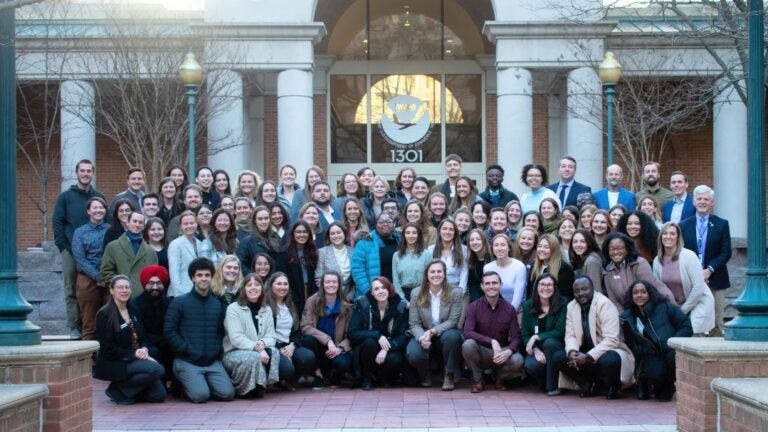
USCSG Finalists Placed for 2024 Knauss Fellowship
This article was updated January 31, 2024.
The National Oceanic and Atmospheric Administration’s (NOAA) National Sea Grant College Program has announced the finalists for the 2024 John A. Knauss Marine Policy Fellowship program. A total of 85 finalists have been selected for the 2024 class, with each nominated by Sea Grant teams across the country. We are pleased to share that four of these finalists were selected from USC Sea Grant. Learn more about our finalists below!
The Knauss Fellowship is a unique professional development opportunity for graduate students interested in national policy decisions affecting ocean, coastal, and Great Lakes resources. This fall, the 2024 finalists will participate in a placement week to interview with several executive or legislative offices in the federal government. Following placement in a host office, they will begin their one-year fellowship in February 2024.
Knauss finalists are chosen through a competitive process that includes several rounds of review at both the Sea Grant program and national levels. The 85 finalists in the 2024 class represent 30 of the 34 Sea Grant programs. Since 1979, over 1,600 fellows have completed the program, becoming leaders in science, policy, and public administration roles. The 2024 finalists will become the 45th class of the John A. Knauss Marine Policy Fellowship program. Learn more about the fellowship program here.
Read the full 2024 finalist announcement from the National Sea Grant College Program here. Congratulations to our four finalists and all 85 finalists across the Sea Grant network!
Learn More About USC Sea Grant’s 2024 Knauss Finalists
Kyla Kelly, Ph.D.
Placement: NOAA OAR, Global Ocean Monitoring and Observing Program
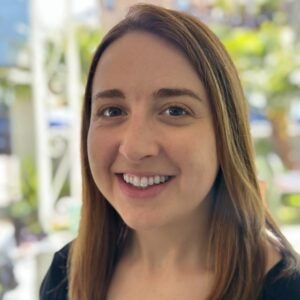 Kyla is earning her Ph.D. in Marine Biology and Biological Oceanography at the University of Southern California. She also holds a Bachelor of Science in Marine Science from the University of New Haven in West Haven, Connecticut. Kyla is an experienced marine biologist with a strong appetite for protecting coastal environments and resources, especially those impacted by harmful algal blooms. She is a driven and highly successful researcher and communicator who has earned multiple academic awards throughout her Bachelor’s and Ph.D. careers, including the Ernest F. Hollings Scholarship. Further, Kyla is passionate about increasing climate science literacy and is a leader in expanding equitable inclusion in marine policy and conservation efforts. Notably, she held the directorial lead in a climate change communication campaign for the American Geophysical Union Thriving Earth Exchange project. The Knauss Fellowship is an invaluable step toward Kyla’s long-term goal of working in policy to address pressing climate and conservation issues.
Kyla is earning her Ph.D. in Marine Biology and Biological Oceanography at the University of Southern California. She also holds a Bachelor of Science in Marine Science from the University of New Haven in West Haven, Connecticut. Kyla is an experienced marine biologist with a strong appetite for protecting coastal environments and resources, especially those impacted by harmful algal blooms. She is a driven and highly successful researcher and communicator who has earned multiple academic awards throughout her Bachelor’s and Ph.D. careers, including the Ernest F. Hollings Scholarship. Further, Kyla is passionate about increasing climate science literacy and is a leader in expanding equitable inclusion in marine policy and conservation efforts. Notably, she held the directorial lead in a climate change communication campaign for the American Geophysical Union Thriving Earth Exchange project. The Knauss Fellowship is an invaluable step toward Kyla’s long-term goal of working in policy to address pressing climate and conservation issues.
Lauren Lees, Ph.D.
Placement: NOAA, National Ocean Service
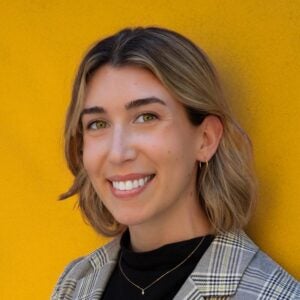 Lauren recently earned her Ph.D. in Ecology and Evolution from the University of California, Irvine. She also holds a Bachelor of Science in Biology with a business and environmental studies minor from the College of Charleston, South Carolina. Lauren is an accomplished researcher and scientist with leadership skills and a uniquely calm and diplomatic demeanor. She has the invaluable ability to communicate research with people of varying social and political backgrounds, which is shown through her collaboration with state legislators, engineers, scientists, non-profit organizations, and the business community to include green energy in South Carolina’s utility grid, as well as her involvement in California’s decadal review process for the Marine Protected Area network. Further, she was awarded a U.S. Department of Defense Antarctic Service Medal for leadership for a three-month Antarctic research cruise requiring the coordination of many different groups. Lauren looks forward to collaborating with the policy sectors that are crucial players in environmental protection.
Lauren recently earned her Ph.D. in Ecology and Evolution from the University of California, Irvine. She also holds a Bachelor of Science in Biology with a business and environmental studies minor from the College of Charleston, South Carolina. Lauren is an accomplished researcher and scientist with leadership skills and a uniquely calm and diplomatic demeanor. She has the invaluable ability to communicate research with people of varying social and political backgrounds, which is shown through her collaboration with state legislators, engineers, scientists, non-profit organizations, and the business community to include green energy in South Carolina’s utility grid, as well as her involvement in California’s decadal review process for the Marine Protected Area network. Further, she was awarded a U.S. Department of Defense Antarctic Service Medal for leadership for a three-month Antarctic research cruise requiring the coordination of many different groups. Lauren looks forward to collaborating with the policy sectors that are crucial players in environmental protection.
Anna Rothstein, M.S.
Placement: NOAA National Ocean Service, Office for Coastal Management, Coral Reef Conservation Program
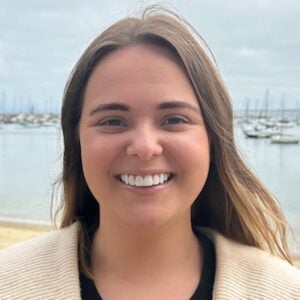 Anna recently earned her Master of Science in Biology at San Jose State University. She also holds a Bachelor of Science in Biology from the University of Puget Sound in Tacoma, Washington. Anna is an enthusiastic and passionate young professional working in the growing field of marine conservation. She is determined to work at the nexus of marine research and policy application and has a compassionate and inspiring mindset to achieve collaborative and successful bipartisan endeavors. Anna worked with the Sustainable Oceans National Science Foundation on developing eelgrass management strategies based on the needs of stakeholders and engaged with coral reef scientists and managers in Hawaii to inform on coral monitoring methodologies, which are now being integrated into statewide monitoring efforts. Anna also strives to increase equitable access to science and has designed K-12 curricula for the minority-serving San Jose Unified School District. She looks forward to learning how to apply her science communication skills to better serve marine conservation efforts.
Anna recently earned her Master of Science in Biology at San Jose State University. She also holds a Bachelor of Science in Biology from the University of Puget Sound in Tacoma, Washington. Anna is an enthusiastic and passionate young professional working in the growing field of marine conservation. She is determined to work at the nexus of marine research and policy application and has a compassionate and inspiring mindset to achieve collaborative and successful bipartisan endeavors. Anna worked with the Sustainable Oceans National Science Foundation on developing eelgrass management strategies based on the needs of stakeholders and engaged with coral reef scientists and managers in Hawaii to inform on coral monitoring methodologies, which are now being integrated into statewide monitoring efforts. Anna also strives to increase equitable access to science and has designed K-12 curricula for the minority-serving San Jose Unified School District. She looks forward to learning how to apply her science communication skills to better serve marine conservation efforts.
Tanner Waters, Ph.D.
Placement: U.S. House of Representatives, Natural Resources Committee, Subcommittee on Water, Wildlife, and Fisheries (Minority)
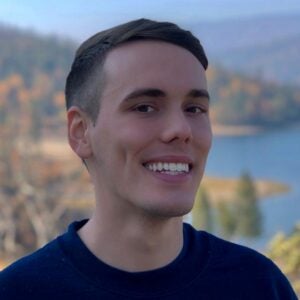 Tanner is earning his Ph.D. from the University of California, Los Angeles (UCLA). He also earned a double major (B.S. and B.A.) in Environmental Science and Earth and Ocean Science from Duke University. Tanner is a very talented, well-rounded, self-motivated scientist with leadership experience in the sciences and consistent, long-term leadership of diversity, equity, and inclusion (DEI) within the sciences. Tanner has applied his primary doctoral research on environmental DNA to many management-relevant issues in the area, including helping the California Department of Fish and Wildlife improve their invasive seaweed monitoring techniques and contributing to the evaluation of Southern California’s network of marine protected areas. His extensive efforts in DEI include serving as Organizer for the Center for Diverse Leadership in Science Mentorship Program at Duke and as the President/Founder of UCLA’s Inclusive Sustainability Collective. Tanner looks forward to gaining hands-on experience in policymaking and training on how science informs such decisions.
Tanner is earning his Ph.D. from the University of California, Los Angeles (UCLA). He also earned a double major (B.S. and B.A.) in Environmental Science and Earth and Ocean Science from Duke University. Tanner is a very talented, well-rounded, self-motivated scientist with leadership experience in the sciences and consistent, long-term leadership of diversity, equity, and inclusion (DEI) within the sciences. Tanner has applied his primary doctoral research on environmental DNA to many management-relevant issues in the area, including helping the California Department of Fish and Wildlife improve their invasive seaweed monitoring techniques and contributing to the evaluation of Southern California’s network of marine protected areas. His extensive efforts in DEI include serving as Organizer for the Center for Diverse Leadership in Science Mentorship Program at Duke and as the President/Founder of UCLA’s Inclusive Sustainability Collective. Tanner looks forward to gaining hands-on experience in policymaking and training on how science informs such decisions.